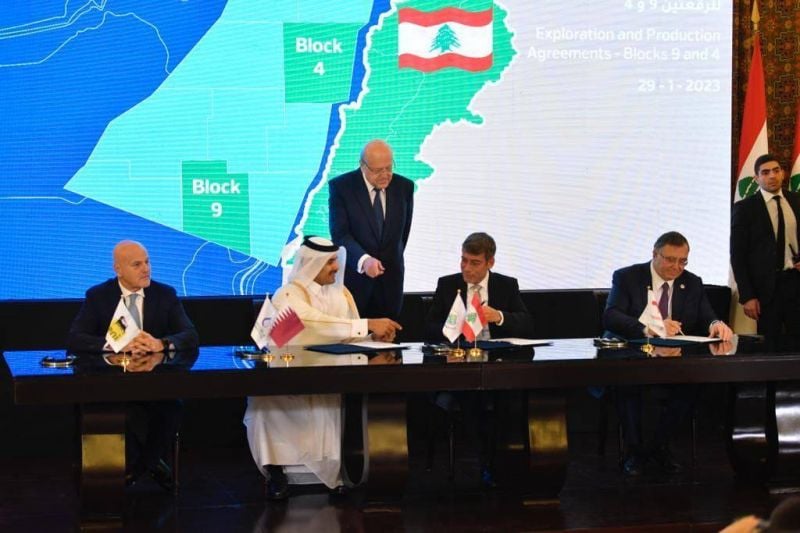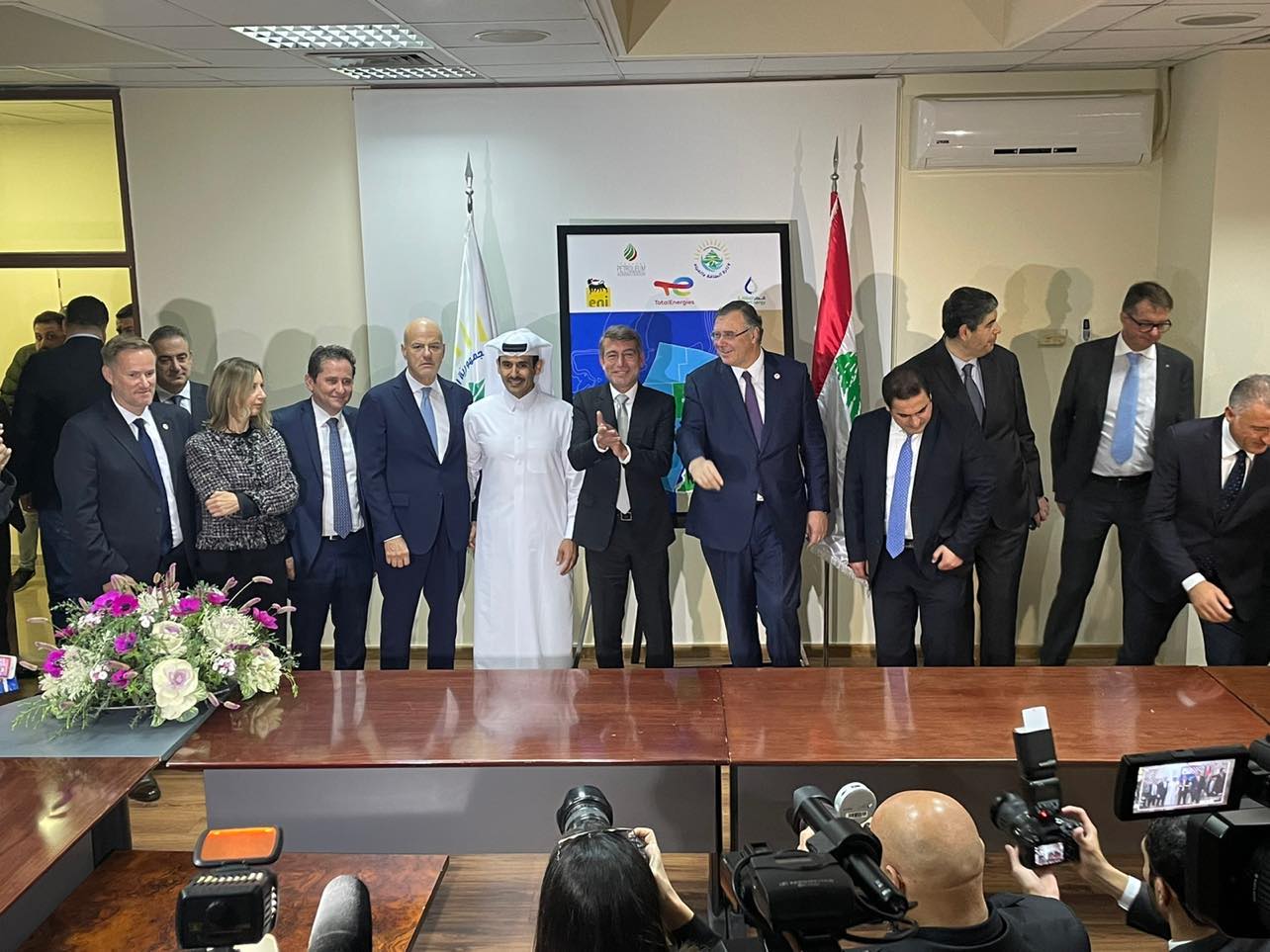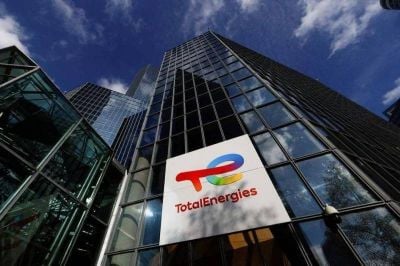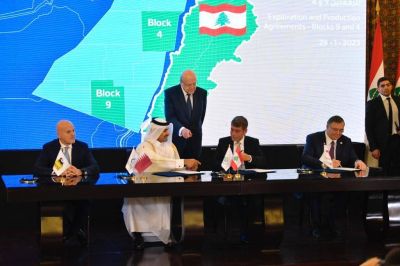
Caretaker Lebanese Prime Minister Najib Mikati, overseeing the signing of an agreement with Qatar for the exploitation of Lebanese offshore gas with France's TotalEnergies and Italy's Eni. (Credit: Mohammed Yassin/L'Orient Today)
BEIRUT — Qatar on Sunday officially became a partner with France's TotalEnergies and Italy's Eni in the consortium that is to start offshore gas exploration in blocks 9 and 4 of the Lebanese Exclusive Economic Zone (EEZ), three months after the signing of a landmark agreement between Lebanon and Israel, under the auspices of the United States, to delimit their maritime border.
The signing ceremony was held at the Grand Serail a few hours after a symbolic signing at the Lebanese Ministry of Energy between the companies involved, including QatarEnergy, our reporter at the ministry and the Serail reported.
 Officials from TotalEnergies, QatarEnergies, Eni and the Lebanese Ministry of Energy on Jan. 29, 2023 at the ministry's headquarters during the signing of an agreement for the exploitation of Lebanese offshore gas. (Credit: Philippe Hage Boutros/L'Orient Today)
Officials from TotalEnergies, QatarEnergies, Eni and the Lebanese Ministry of Energy on Jan. 29, 2023 at the ministry's headquarters during the signing of an agreement for the exploitation of Lebanese offshore gas. (Credit: Philippe Hage Boutros/L'Orient Today)
The ceremony at the Energy Ministry was attended by caretaker Energy Minister Walid Fayad, Qatari Minister of State for Energy and Executive Director of QatarEnergy Saad ben Sharida el-Kaabi, as well as TotalEnergies CEO Patrick Pouyanné and Eni CEO Claudio Descalzi.
The offshore areas of the Eastern Mediterranean and the Levant have seen significant gas discoveries over the past decade. Interest in these areas has increased since Russia's invasion of Ukraine disrupted the flow of the commodity.
Lebanon has divided the offshore Exclusive Economic Zone into 10 blocks, and Block 9, where the Qana field is located, was part of the disputed area with Israel before the October agreement. The consortium is also responsible for exploiting Block 4, opposite the central Lebanese coastline, where exploration has not resulted in the discovery of commercial quantities of gas.
A consortium of France's TotalEnergies (40 percent), Italy's Eni (40 percent) and Russia's Novatek (20 percent) had won the first offshore hydrocarbon exploration and exploitation licenses issued by Lebanon in 2018 for two of the 10 blocks in the EEZ, including Block No. 9, which is located in the area the country was disputing with Israel.
The consortium thus had the initial exploration license for Block 9, but the agreement had been restructured after Novatek withdrew from the group in August 2022 due to the war in Ukraine. Its shares were thus transferred to the Lebanese state last September, which then transferred them to TotalEnergies. QatarEnergy thus replaces officially today Novatek.
With the agreement reached on Sunday, Total Energies and ENI now hold 35 percent of the shares each, while QatarEnergy holds 30 percent and not 20 percent as was the case with Novatek, according to a diplomatic source who spoke to L'Orient Today. Reports of Qatar's interest in replacing Novatek were circulating as early as October.
'Promising' exploration round
"Qatar is still committed to supporting a better future for Lebanon," the Qatari official assured at the Grand Serail, speaking of a "promising" exploration round ahead, according to our reporter.
Pouyanné, referring to the common history between Lebanon and France, said, "For a Frenchman like me, [this agreement] is very symbolic." He acknowledged, however, that the first results of drilling in Block 4 were "disappointing." "I know that the Lebanese are impatient," he added. Total's CEO explained at the press conference that the exploration process for the Qana field should be completed "within the next 12 months" and expressed hope that a gas discovery could be announced at that time.
"This is an important agreement for Lebanon but also in the [international] context marked by the energy crisis," Eni head Descalzi said.
For his part, caretaker Prime Minister Najib Mikati praised the role of the United States, through its mediator Amos Hochstein, which led to the signing of the historic agreement with Israel last October. Mikati said he "hopes that the process will lead to the exploitation of gas through concrete actions."
Fayad, meanwhile, expressed his hope that "future discoveries will allow Lebanon to achieve its strategic and financial objectives."
Political significance
"The entry of Qatar in the consortium has a political significance" for Lebanon in the midst of an economic collapse, energy expert Naji Abi Aad told AFP. He explained that this involvement of the rich gas emirate "brings a political guarantee," especially because of Qatar's links with Western countries and even with Israel.
Cana
In November, TotalEnergies and Eni signed a framework agreement with Israel to launch exploration. The consortium will now be able to explore a "previously identified prospect that could extend both into Block 9 and into Israeli waters south of the recently established maritime border," according to the French group.
The potential Qana deposit has been highlighted by seismic analysis of the rock and will have to be confirmed by an exploration campaign. Eventually, Israel will be paid by the firm operating Qana "for its rights on possible deposits," according to the text of the agreement; the Israeli government estimates its share at about 17 percent. Analysts agree, however, that it will take several years for Beirut to enter the exploitation phase in case of a commercial discovery.
"The problem is that infrastructure is needed to export the gas, which currently does not exist. And if the gas is used for local consumption in Lebanon," where power plants are almost at a standstill due to the economic crisis, "it will be necessary to build a coastal pipeline to supply these plants," Abi Aad said.
Israel, for its part, has already begun extracting gas and delivering it to its neighbors Jordan and Egypt. Last June, it signed an agreement for the liquefaction of its gas in Egypt in order to transport it by ship to Europe.
Lebanon still has eight blocks of its EEZ to put into play. It attempted to draw interest to them in a second licensing round launched in April 2019 and reset at the end of 2021, but has not yet found a buyer.
Additional reporting contributed by Philippe Hage Boutros

